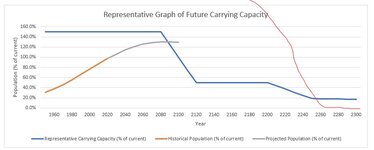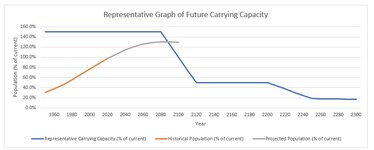Ok, so we just keep raising our standard of living with the same population but with less impact on the Earth.
Great. We have been trying that for a century.
We haven't. We have started working towards that, about sixty years ago; It became clear that it was working - that birthrates were declining substantially - about forty years ago; and due to demographic lag (the people born in the 1970s and '80s had their children in the '90s and 2000s, but won't die until the 2050s and '60s) we are not going to be able to START
trying that until the middle of this century, without killing people.
You yourself have repeatedly agreed that genocide isn't acceptable; The unavoidable consequence of that is that we cannot possibly have begun the experiment you claim we have conducted for a century, and won't be able to for thirty odd years.
To declare failure now is more than a little premature.
A century ago, the population was still increasing unchecked, and the people born a century ago had already had most of the children they were ever going to have, by the time the oral contraceptive was developed, much less widely available.



